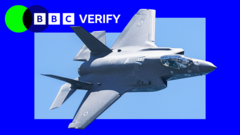The ongoing conflict in Gaza is throwing the spotlight on the United Kingdom’s military relationship with Israel. UK Foreign Secretary David Lammy has openly criticized Israel’s military tactics and expressed disappointment over the international community's failure to halt the violence. He described the recent casualties of Palestinians, including civilians at aid centers, as "sickening" and emphasized that the UK could "do more" if Israel does not amend its approach to the conflict.
Public attention has shifted towards the UK's military support for Israel amid these hostilities, particularly after the escalation that began with the attacks on October 7. While the UK is not among the primary arms suppliers to Israel—behind the US, Germany, and Italy—it has approved arms export licenses to Israel totaling over £500 million since 2015, with considerable focus on the UK's contribution to the F-35 jets used in strikes on Gaza.
The F-35, a multi-role fighter jet, incorporates components from the UK amounting to 13-15% of its total assembly, including critical systems that enable combat operations. Despite a suspension on many arms licenses by the Labour government after it returned to power, parts for the F-35 were exempted from the ban, illustrating a "loophole" noted by experts in the field of arms export.
In addition to arms exports, there has been scrutiny regarding the UK's potential sharing of military intelligence with Israel. Amid the ongoing conflict, the Royal Air Force has been conducting surveillance missions over Gaza but maintains that it is not sharing intelligence with Israeli Defense Forces (IDF). The UK has characterized its involvement as solely focused on humanitarian efforts, particularly in search operations for hostages taken by Hamas.
Reports indicate that at least “fewer than 10” IDF personnel have participated in non-combat training in the UK annually, focusing on non-combat strategies. However, the government has also faced challenges regarding its stance on Israel's actions, especially following a change in political leadership that intensified critiques of Israel.
In a recent shift of policy, the Labour government expressed support for arrest warrants against Israeli officials implicated in war crimes and joined a consortium of nations condemning Israel's actions in Gaza. Despite this, it has yet to impose direct sanctions against the Israeli state, leaving many to wonder about the effectiveness and sincerity of the UK's approach amid the ongoing humanitarian crisis resulting from the conflict. As the war rages on, the debate over the UK’s role in the conflict continues, raising essential questions about military ethics and international relations.



















